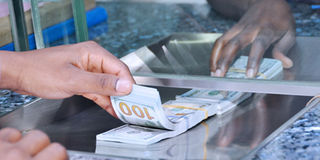Why you must be wary of illicit funds

Many companies, especially multinationals are involved in activities that deprive host countries of tax revenue. FILE PHOTO
What you need to know:
- According to research conducted by Mr Tom Calderone from Global Financial Integrity, in most developing countries, few or nobody at all is doing sufficient work to address the problem of illicit financial flows.
Illicit Financial Flows (IFFs) have been defined as the flow of money or valuable assets across borders associated with crime and corruption, including tax evasion.
This is a global challenge that has damaged tax revenues of developing countries globally. With Uganda estimated to lose about Shs2 trillion to IFFs each year, it is evident the country has not been spared.
IFFs can be executed through various means including money laundering, which is the process of transforming profits from illegal activities into legitimate assets.
But trade mis-invoicing (TM) is the most commonly used method by the business community to evade taxes, a report released this week by Global Financial Integrity (GFI) said.
Trade mis-invoicing is the act of conniving between importers and exporters to misdeclare the value of shipments. Trade mis-invoicing can also occur in services such as accounting or IT can also be subject to mispricing.
GFI President, Mr Raymond Baker, in the report titled, ‘A Scoping Study of Illicit Financial Flows Impacting Uganda,’ says the propensity for mis-invoicing “merits serious attention” and has a “sever” impact on Uganda’s economy.
From 2006 to 015, TM for commercial imports was $4.9b (Shs18.5 trillion) and $1.7b (Shs6.4trillion) for commercial exports, GFI said.
In other words, the $4.9b (Shs18.5 trillion) lost in trade mis-invoicing of commercial imports over the 10 year period is more than the country’s 2018/19 targeted tax revenue of Shs16 trillion.
While efforts to strengthen tax administration such as round table discussions ensue in Uganda, corruption is a major propellant of tax evasion.
Gaps in a country’s policies can also create an environment ripe for revenue loss. Tax avoidance is a legal yet clever way for companies to dodge taxes. Multinationals whose headquarters are stationed in tax havens have dodged taxes in countries in which they operate, since most of the money is moved to these tax havens with lower taxes. This robs the developing countries where they operate of a fighting chance to increase their tax base.
The act of transferring money to other sister companies is known as transfer pricing. Companies use this method to send money from subsidiaries to sister companies in tax havens such as Mauritius and Netherlands among others.
Double taxation agreements (DTAs) which are used by countries to share taxing rights related to foreign direct investment have also been abused by multinationals deliberately basing their companies in tax havens to avoid paying taxes in Uganda. A recent presentation by Oxfam Uganda showed that as much as $300m could be lost in one oil block in western Uganda though its DTA with Netherlands alone.
The Financial Intelligence Authority, (FIA) has said it will combat IFFs. In a recent stakeholder meeting with non-governmental organisations (NGO’s), the FIA executive director, Mr Sydney Asubo, urged NGO’s to critically analyse their source of funding to eliminate chances of money laundering. The meeting came after the National Risk Assessment report by the FIA pegged NGOs as one likely conduit for terrorism financing and money laundering, among others. Other risk sectors include banks, lawyers, accountants, gem traders and mobile money, among others.
Asubo told Daily Monitor that while Uganda’s legal framework was well equipped to deal with the risk posed by IFFs, the institutions involved in combating money laundering – including the FIA, police, prosecutors and investigators – needed to well financed and equipped.
This story was written as part of Wealth of Nations, a pan-African media skills development programme run by the Thomson Reuters Foundation in partnership with the African Centre for Media Excellence. More information at www.wealth-of-nations.org



